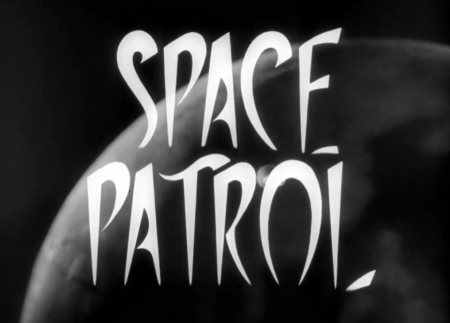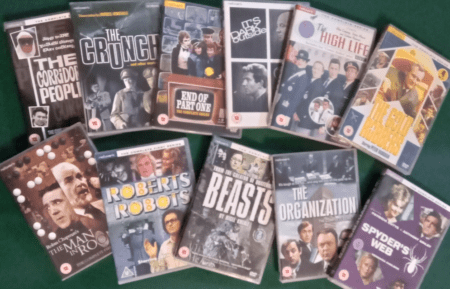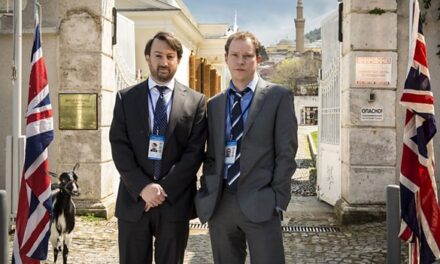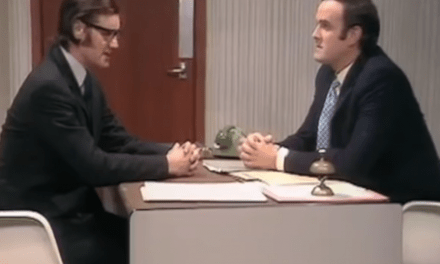The sudden loss of Tim Beddows, Managing Director and founder of Network Distributing Limited at the age of only 59 is a terrible, sobering shock that I’m still attempting to process even after a week or more. In addition to having the pleasure of chatting to him so many times, this media company that Tim launched and nurtured as his passion project is really something that over the last 25 years has made many of the television-based dreams that I – and countless others – have had for the last 50 years or so a reality.
I was a Network customer long before I had the chance to work for Tim and his team.
Archive television has been a passion of mine since childhood, fuelled when I was able to glimpse extracts from my favourite series, Doctor Who, made before I was born on editions of Blue Peter or The Lively Arts, and able to experience programming from a bygone age like It’s a Square World, Hancock, Cathy Come Home, That Was The Week That Was and Nineteen Eighty-Four when they were included in BBC2 line-ups such as Festival 40 and Festival 77. Eagerly devouring the published televisual histories and then embarking on my own trips to earlier eras of listing magazines and trade journals, the frustration mounted at the inability to actually experience the broadcasts themselves beyond specialist screenings at fan events dedicated to ‘cult’ shows, curated festivals at the National Film Theatre, oddities embraced in nostalgia strands like Six of the Best or The Best of British, or the primordial scheduling of Channel 4.
When VHS technology finally started to offer a direct route from archival vault to living room screen, the notion of having improved prints of favourite shows like Doctor Who or The Prisoner ‘on tap’ was a delight while getting to experience others like Quatermass and the Pit was even better… but there was always the awareness that the bulk of the titles offered on the high street were the established ‘big hitters’, the tried and trusted brands featured regularly in retro mags and TV theme nights or currently in the first-run schedules.
It was therefore a great surprise when the nearly forgotten SF marionette hokum of Space Patrol turned up commercially in 1997, released from where it had been trapped in an obscure backwater of long-lost 1960s ITV scheduling and now available to purchase from WH Smith. ITC and other companies had previously exploited similar fare with home releases of potently popular and colourful runs of Thunderbirds and Captain Scarlet and the Mysterons from the Gerry and Sylvia Anderson stables… but had experienced cold feet when digging further into the couple’s output with the monochrome likes of Supercar. But here were VHS tapes chronicling the black-and-white adventures of Captain Larry Dart and the crew of the Galasphere that were even more obscure than those of Mike Mercury.
And the name on the box was Network. Clearly, this was one to watch.
Then with the dawn of DVD, the shelves of our lounge started to bulge with the weight of shiny discs containing restored copies of old favourites such as The Sweeney or Star Cops, and much-loved favourites previously too humble to qualify for commercial release such as The High Life and A Very Peculiar Practice. The Thames Public Eye series could now be enjoyed in its entirety – not just the colour episode and all free of the UKGold on-air branding of the VHS copies in circulation. The Goodies and Sykes started to surface on the new media… with not only the full, uncut episodes that had been dreamed of for so long but accompanied by value-adding commentaries, out-takes or script PDFs or other bonus features.
It was a comparatively casual enquiry to Network regarding imagery for their prospective release of Ripping Yarns that led to a sudden freelance job offer from Tim. My tentative phone call was rapidly escalated through a company that – due to its prolific output – I’d assumed was on par with Warner Bros and Universal, but was in fact literally the dozen or so people whose names were printed on the inside of each DVD sleeve. So, I’d done some research into Ripping Yarns had I? Well, would I write some viewing notes for Network? I would? Well, would my wife and I like to come over on Saturday and we could pick up all Michael Palin’s paperwork as a starting point and we’d take it from there…
And that was the start of the next eighteen years for me, with Network as a major customer in my hobbyist capacity as a freelance writer and researcher alongside a career in data development. Almost two decades packed with once-in-a-lifetime projects that my younger self could never have dreamed would become a reality… and yet here they were, appearing as physical product.
And these were amazing ventures that for me – as a devotee – were of a scope and scale beyond anything I’d imagined that a commercial company could take a gamble on. The ‘viewing notes’ for Ripping Yarns had come in at a modest 11,000 words that filled 24 pages of booklet. By the time that The Beiderbecke Affair with its sequels and predecessor were being documented, we were up to 30,000 words (‘That’s half a novel! Better you than me’ remarked Alan Plater) and 48 pages. When I delivered a draft of 114,000 words on the hour-long episodes of Danger Man, I waited for what I believed was the inevitable “Please could we lose 75% of this to make it fit?” response… instead to be amazed at the frankly unexpected “Tim says we can go with this as a fully-bound book.”
Opportunities continued, allowing me to delve into some of my favourite shows with a perspective that was always enabling and seldom restrictive. The Human Jungle, Ace of Wands, The Goodies, Public Eye, Callan, Quatermass, Shoestring… And access that I could never have realistically hoped for to materials. “Okay Andrew, Python (Monty) Ltd have given us access to their archive, and we’re scanning all the original scripts and production schedules to send over… No worries Andrew, we have just about every script and call sheet for The Professionals all here in my office – when d’you wanna come and sort through them?… Would you like to do the BBC Maigret? Yes, we realise that this is in the middle of lockdown and you’ve got to do it without setting foot outside the house, but whatever you can do, we’d be happy to run… Okay Andrew, that sounds fine, yes, we can do that – budget cleared – go for it…”
… and beyond the opportunities themselves were the thoughtful gestures. Receiving a card from the Post Office that they were holding a package for us which was, most likely, the 40th anniversary DVD set of The Prisoner, my wife and I ventured to the local sorting office… to discover a long, thin cardboard tube that clearly didn’t hold shiny discs of 1960s pop culture. What it did hold was a printed dummy of the DVD box that Tim had got the then-reclusive Patrick McGoohan to sign for me when the show’s creator had been pleased with the viewing notes. Utterly unexpected… like so much of Network’s output driven by Tim’s instinct and his desire for the unpredictable.
Then there were the soundtrack albums. Network presented me with nine complete scores for Randall and Hopkirk (Deceased) – a batch of 200 cues running to over three hours. So, okay, very nice… but presumably you’re just going to cherry pick around an hour of the longer cues to form a single CD for a commercial release of a comparatively obscure series (especially when more established shows of the same era are lucky even to get ‘best of’ compilations). “Well, yes Andrew, in the fullness of time, we are, but in the meantime, you just sequence these across three discs and make sure all the material’s in there. Oh, and by the way, Man in a Suitcase will be next, and that’s likely to be nearer five discs…”
Now, I mention these because I’m trying to demonstrate the fun of working with Tim and Network and his kindness and thoughtfulness… and I can only illustrate these with examples of my own personal experience which, under normal circumstances, I probably wouldn’t be sharing in this manner. I know that other people who worked with Tim on Network projects had the same sort of thrill and sense of wonder at what they were also allowed to achieve. But those stories belong to them and – if they want to – it is up to them to tell their stories in the way that they want to. I want to convey what it was like to be involved with Tim’s visions – and this is the best way that I can find to do it.
But more importantly than the things that we did work on were all the things that my wife and I have enjoyed simply in the capacity of what we were originally – customers. The seemingly never-ending list of niche titles continued with shows that we’d believed we’d probably never see, let alone own complete existing runs of with bonus features. The Corridor People, Spyder’s Web, The Crunch, The Sentimental Agent, The Sandbaggers, Beasts, Strangers, Out, The Feathered Serpent, The Gold Robbers, Roberts Robots, The Man in Room 17, Hot Metal, Espionage, The Hanged Man, End of Part One, Travelling Man, Whodunnit?, Turtle’s Progress, The Fellows (Late of Room 17), It’s Dark Outside, The Organization…
Back in 2013, we saw one of Tim’s presentations at an academic conference in which he reiterated his company’s approach to ensure that the mass crowd-pleasers would fund the more specialist fare. “For every one copy of the restored Odd Man Out starring James Mason, we sell ten copies of Odd Man Out starring John Inman,” he declared. It was Tim’s vision for a company that they would make a vast range of materials available in the best manner possible – connecting connoisseurs with long-lost gems that they may never even have heard of. To be e-mailing enthusiastic acquaintances in Canada to discuss series such as Virgin of the Secret Service that had never previously made it beyond the shores of the UK is a credit to the scale of Tim’s ambition to made product available.
So much of Network’s operation was tied up in Tim’s head. And it could be chaotic and erratic and like trying to nail mercury to understand that vision… with frustrations at continually shifting goal-posts and ever-evolving packages expanding to embrace some newly discovered obscurity on an instinctive whim. But we also knew that if it had all been organised and regimented and planned and locked-down then there wouldn’t have been that freedom to push the boundaries and to take on these ventures of a crazy scale or a level of obscurity – things that another publisher wouldn’t even countenance from an initial proposal. Yes, Tim’s instinct made him go for it…
So, thanks for all the opportunities for writing about television, Tim – I really appreciated them, and I hope that I told you that regularly when we were doing them. And thanks for giving my wife and myself so many neat things to watch via Network for so many years.
And we’ll try to get those other projects you had planned out just the way that you wanted…
Andrew Pixley is… well, it doesn’t really matter who Andrew Pixley is. Because this is about Tim Beddows and the vision that he made a reality. Thanks again Tim! Thanks from all those researchers and academics who were reunited with or connected with the programmes that they wanted or needed to see.
Tim Beddows (1963-2022). RIP.










How very sad but thanks, Andrew, for this tribute. He sounds like a wonderful man.
You’re very kind Christine, as always…
… and also very right. He was wonderful… and he did wonderful stuff.
Thank you
Andrew
So sad to hear of the passing of Tim he was Mr network, I cherish all of my many cult tv purchases from the Anderson shows to the action of the ITC classics thank you for your amazing efforts these past years, RIP.